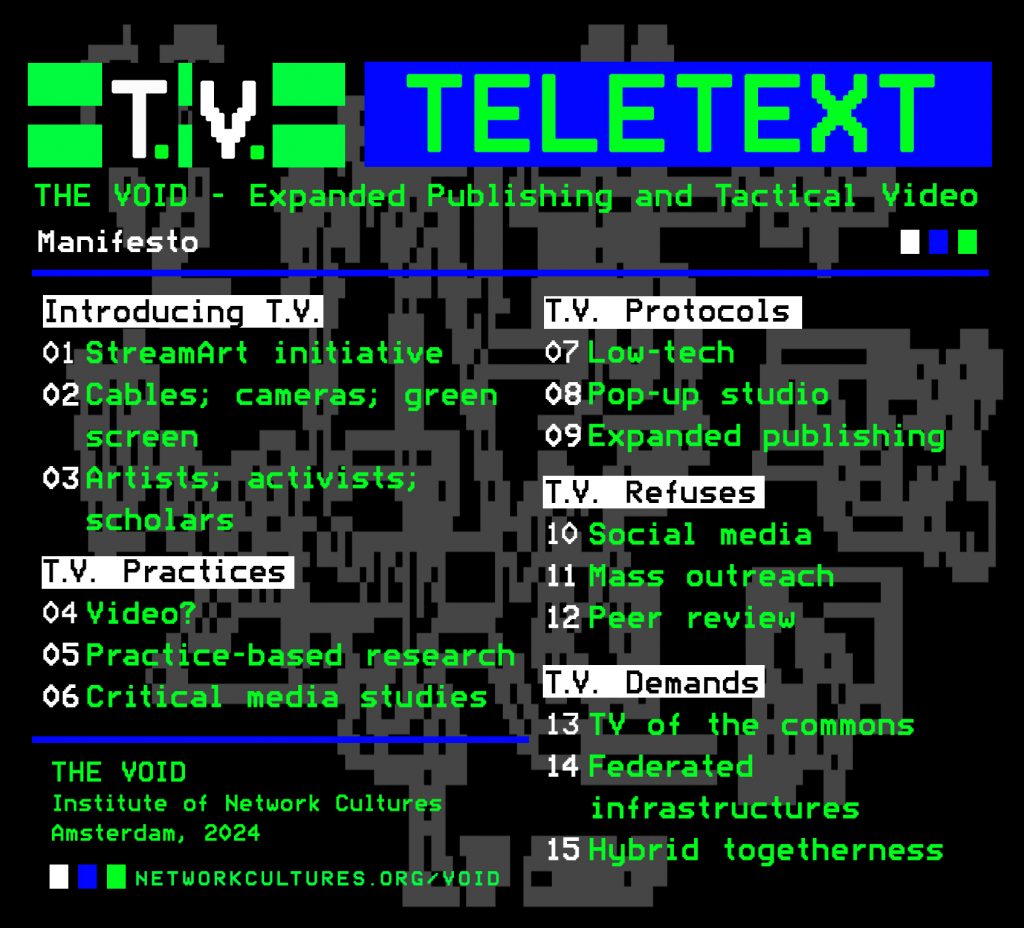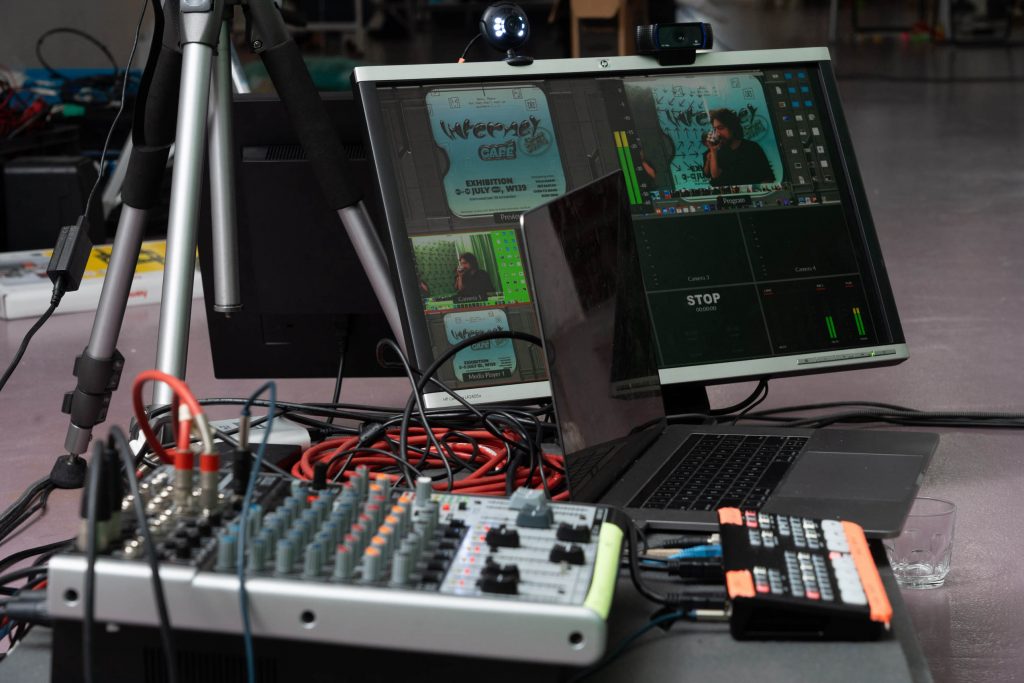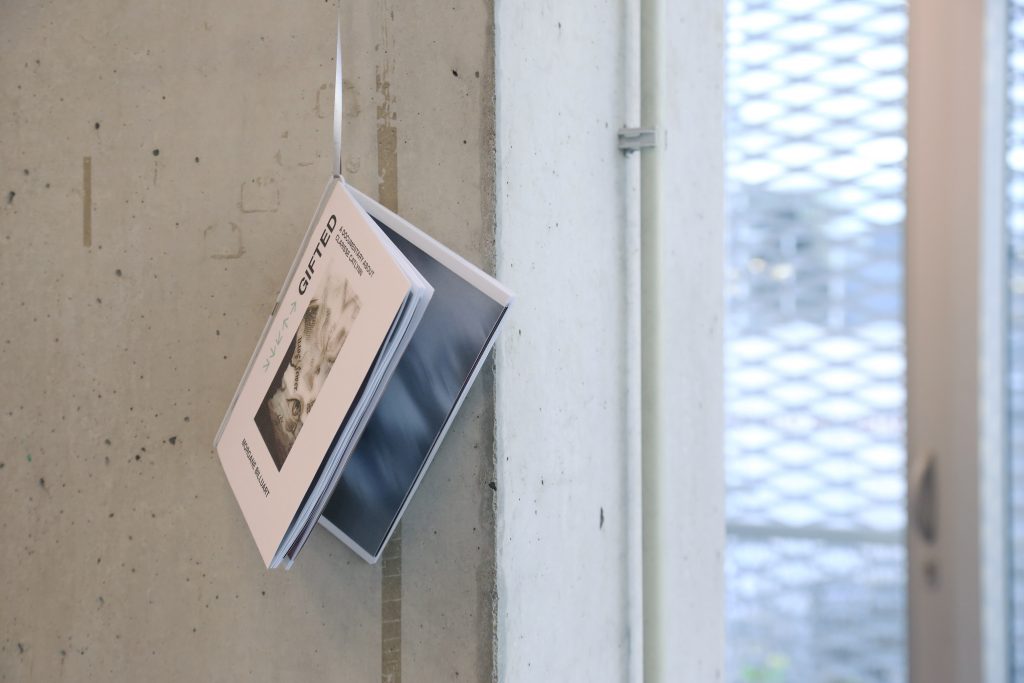T.V. MANIFESTO
THE VOID (T.V.) is a research project on tactical video and an audiovisual publishing venue for practice-based research at the Institute of Network Cultures, part of the Amsterdam University of Applied Science.
THE VOID (T.V.)
Making T.V. is mostly about organizing cables: getting a space (either borrowed, booked, or squatted), setting up tripods, putting up green screens, connecting monitors, lighting up a studio, and welcoming collaborators. In many ways, all of these actions end up in physical cable management but can also be seen as metaphorical cable management of aesthetic and social feedback loops. We don’t want to remain at a metaphorical level, though. The hours of manual labor with technical equipment that go into online video streaming overshadow those of sitting in front of a screen reading, typing, and clicking. We, at T.V., have nonetheless previously framed making T.V. as research. As such, it would be hypocritical for us to underestimate the importance of theoretical reflection to establish a critical practice. And yet, doing T.V. asks for a set of skills that often diverge from how traditional theoretical research is conceived. Practice-based research requires you to leave the computer monitor aside (although not for very long) and, in our case, spend the day with cables in a basement-turned-into-studio.
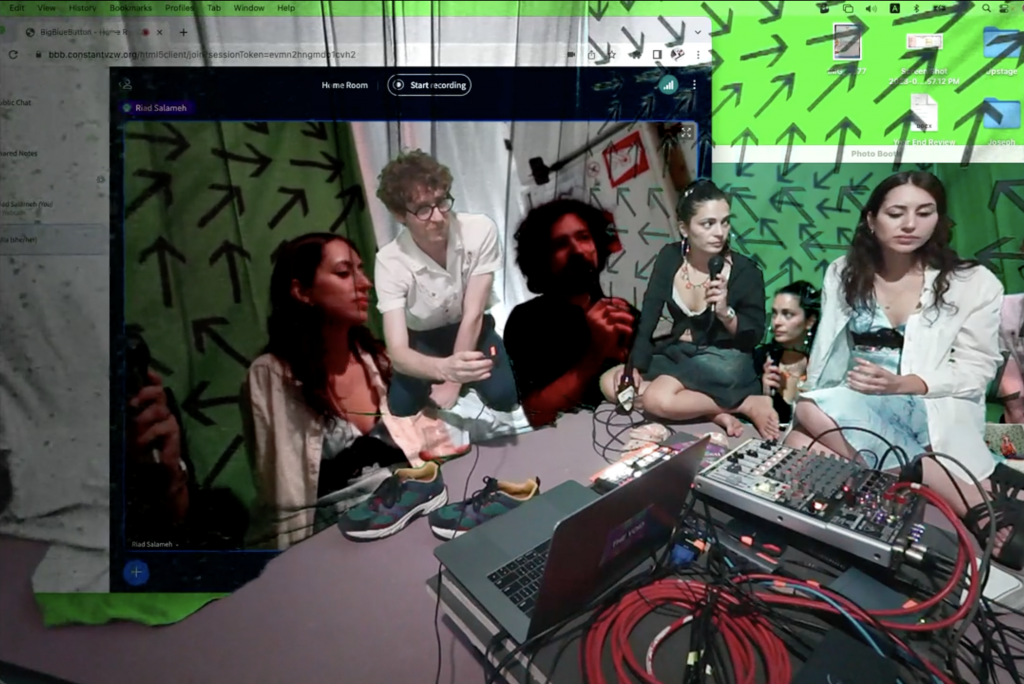
Researchers and theorists of the past have mostly used text as their favored medium probably because they hardly developed a close relationship with the tools and logic of technical and media creation. For T.V., making T.V. means to develop a practical know-how that is not opposed to theoretical knowledge, but rather one that complements it and pushes it forward. Or, more radically, making T.V. shows (streams?) that theory is always rooted in collective practices. In our case, online audiovisual production.
T.V. practices online video with the hope of doing it differently: it is both a practice-based research project on hybrid audiovisual assemblages around a streaming studio and a publication venue for audiovisual practice-based research. T.V. focuses on the increasing presence of video production in research and artistic practices. By providing resources to critically work with this mediatic landscape as well as sharing and supporting research practices that center a critical engagement with media, T.V. expands the role of digital audiovisual production practices as a research methodology.
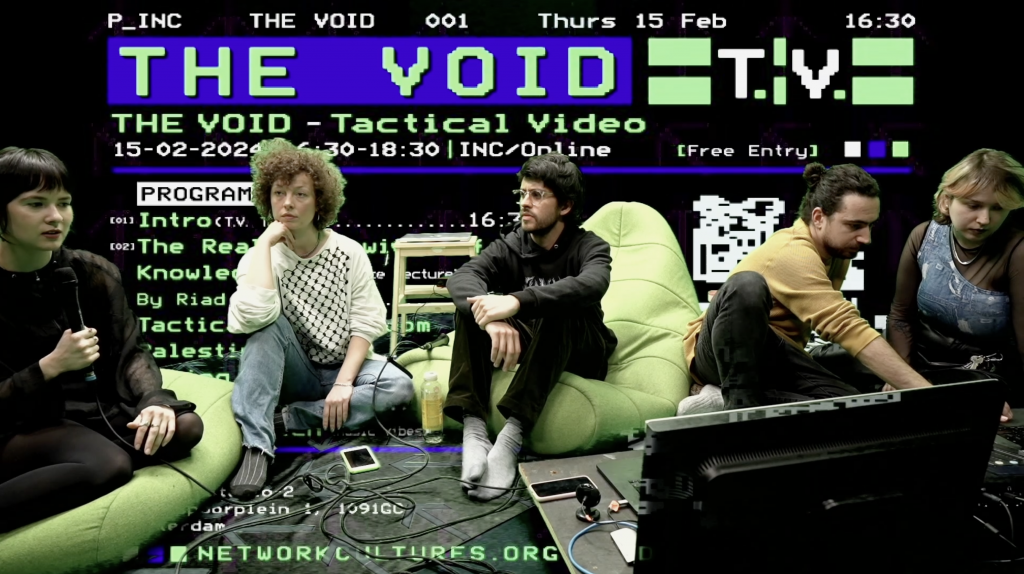
In the same way that practice-based research creates knowledge through alternative modes of production (in our case, from the researcher’s computer screen to the green-screen-studio-feedback loop), it also calls for expanding publication formats. T.V. aspires to create the means and tools for practitioners not represented in the current publishing industries. To put it concisely, T.V. expands publishing for practice-based research. For T.V., producing, hosting, distributing, and consuming media is not about illustrating previously existing research or knowledge, but about doing things: working with media is actively doing research.
T.V. is a space and practice of critical media studies. It is inscribed in a tradition that expands outlooks on the way we see, read, and talk about online media. Yet, we strive to unbound knowledge about media from the position of the interpreter or the commentator. This is why we bring the ambitions of tactical media to the core of critical media studies. Knowing about media is also about intervening with media: using and creating media on our own terms – not solely communicating about how media represent the world, but collectively getting involved in a world constituted by distributed online media production.
We see video as an opportunity to come together and figure out how to inhabit online spaces with vulnerability and solidarity. For T.V., video is then a hybrid event, an occasion to pollute online spaces with offline encounters and, vice versa, to rearrange how we physically exist together mainly through the tool of the studio. A pop-up studio branching out into the offline (events, zines, workshops) and online (a website, repository, publications, live stream), producing occasions to share and plot common urgencies, resources, and know-how. Using online video not only to show, document, or witness, but also as a way to share practices and politically engaged understandings for the production, archiving, distribution, and interpretation of online content, we underline the inherent hybrid togetherness of the online experience.
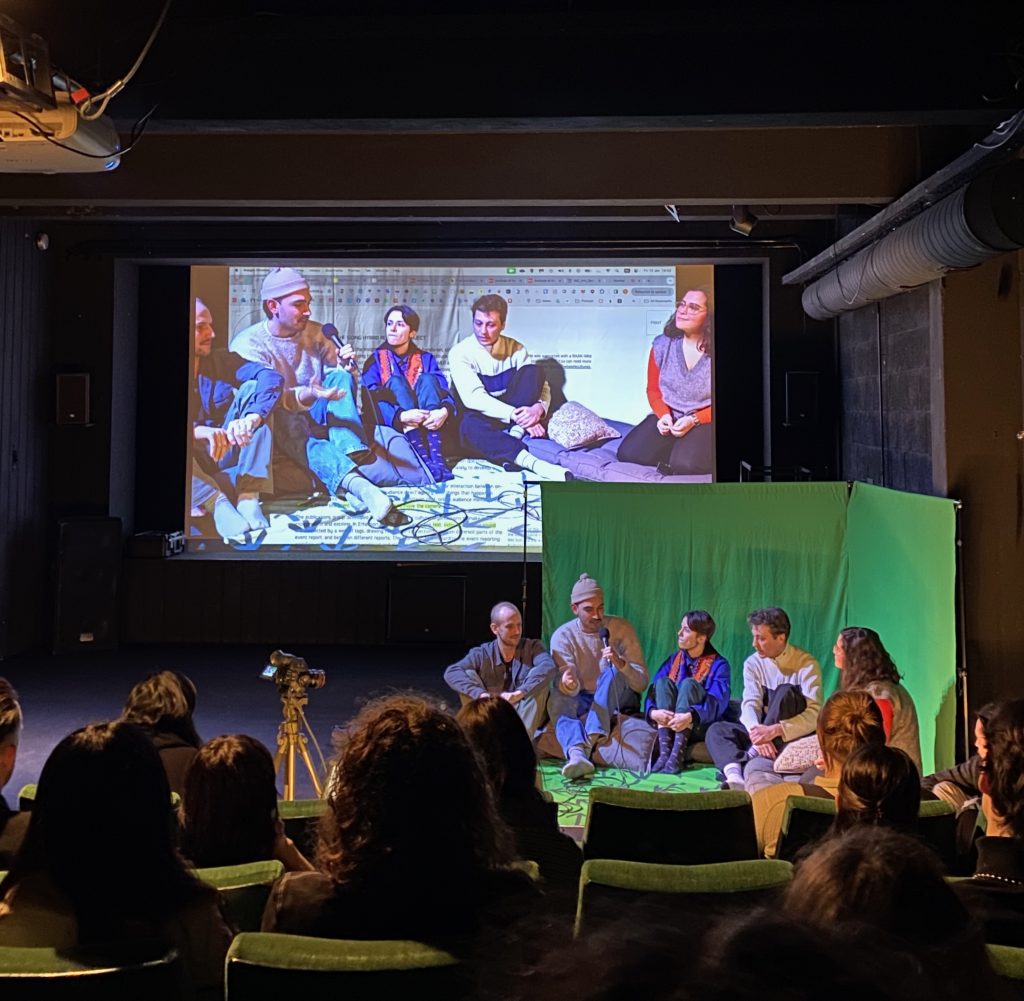
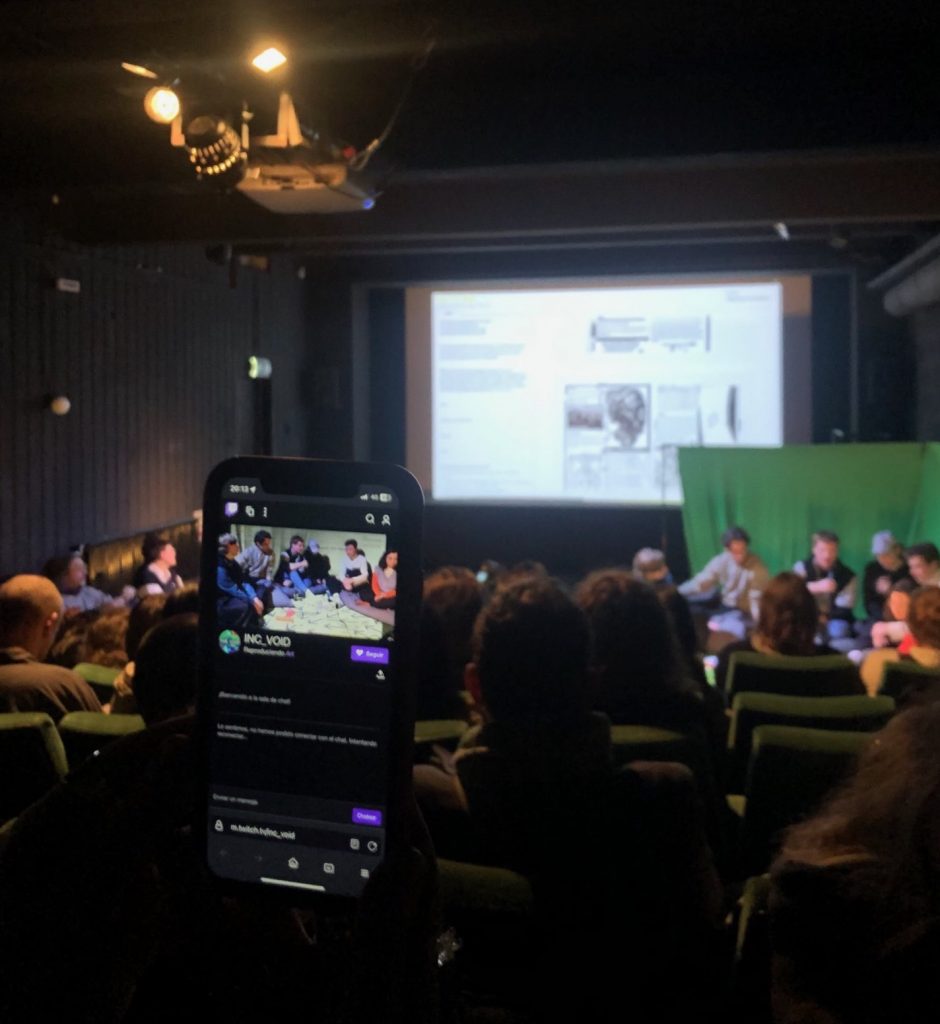
We promote intimacy with technology that escapes big tech’s nightmarish fantasies of immersion, and intuitive constant communication, but that is also not confined to the overly technical hacker imaginaries pushing for universal coding literacy. We are inspired by the culture emerging from platform content creation that, while deeply neoliberal, has produced a distributed collective of technical users. A dispersed collective that has developed diverse yet specific aesthetic sensibilities and a profound understanding that the digital has always been a physical (and cultural) gesture. To put it differently, it is a collective for whom hours of scrolling, binge-watching, and streaming on multiple (horizontal and vertical) screens have made it self-evident that these are not merely devices to be operated at will, but a hybrid environment to inhabit. A hybrid environment in which distinctions between representation and intervention collapse into feedback loops or recursive chains of localized operations between software, green screens, microphones, mixers, monitors, cameras, data, people, and (most importantly) cables, establishing new ways of moving, sensing, communicating. Of being together.
By highlighting tacticality and technical practices, we recall the political heritage of communities around early networked communities. From bak.ma to indymedia and UKRAiNATV, we bring back practices and affordances of independent video making, TV, and radio to produce new ways to inhabit a stagnating online media landscape. This heritage is a reminder that before any technical system appears as such, it is preceded by an array of unstable practices that are then stabilized into commoditized standards. As social networks evolve into streaming platforms, we want to latch onto this instability to reconsider the possibilities of online media by looking at it as a hybrid and precarious assemblage of legacy media tools, protocols, and practices. If early online broadcasting initiatives were instances of pre-standardization, T.V. seeks opportunities of post-standardization: de- and re-stabilizing online video as computational artisanship in a parasitic yet conflictual relation with platformized/industrial modes of production.
From video podcasts to live streaming, we don’t work with a clear standard. We regard this as a strength: centering experimentation and openness to collaboration as the overarching attitudes to approach video work. For T.V., online video stops being solely a digital medium, a final outcome towards which all activities are directed, but the networks of open-ended relations and practices around a precarious (and for that reason, very material) studio we inhabit together.
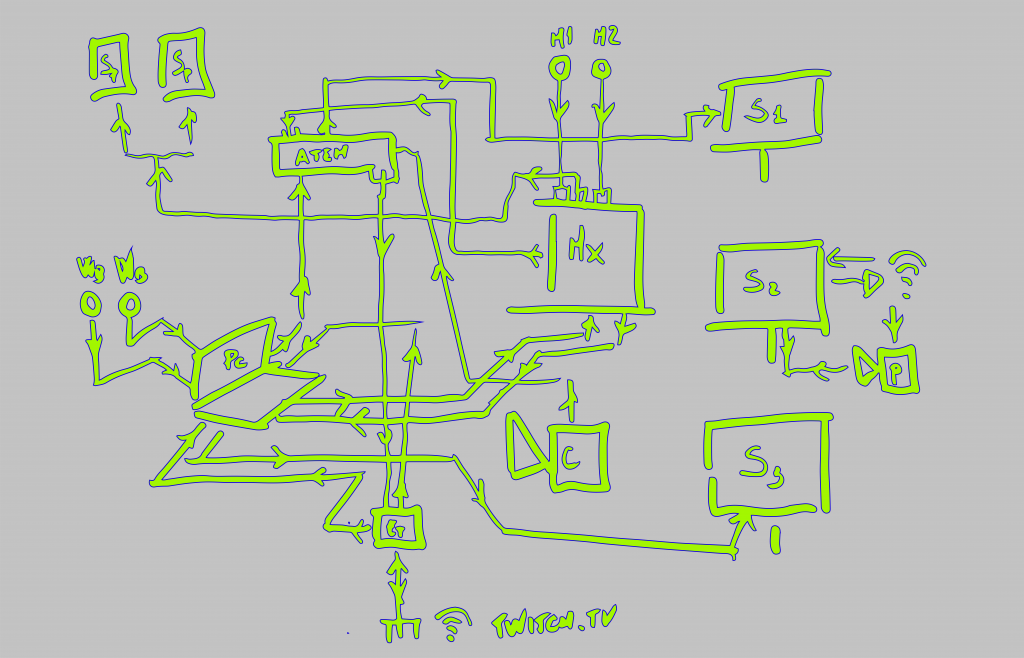
From T.V., we make a call to all practitioners who want to share a green screen. To those who inhabit video in its online and offline, virtual and material, offshoots, we invite them to collaborate and figure out together new ways to exist in hybridity. And, hopefully, create a TV of the commons, a StreamArt cooperative, a distributed organized network for audiovisual practice, and a politically engaged federation of practitioners to reclaim our technological life in common.
T.V. Team

